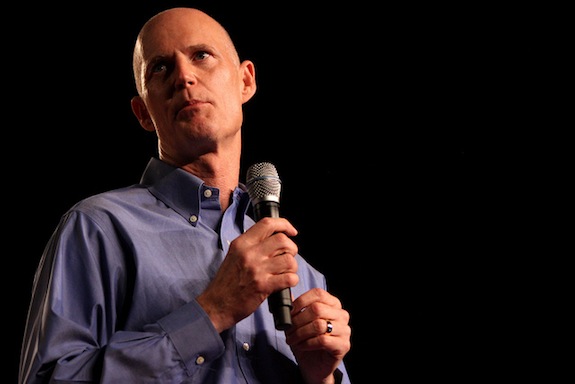
A judge ruled that Gov. Rick Scott can continue purging non-citizens from the state’s voter rolls. (Photo by Gage Skidmore)
By Ashley Lopez
Florida Center for Investigative Reporting
A judge in Fort Lauderdale on Oct. 4 ruled that the state may continue removing non-citizens from its voter rolls even though Election Day is just around the corner.
According to The Miami Herald, the judge said that “federal law does not prohibit the state of Florida from purging noncitizen voters within 90 days from Election Day”:
U.S. District Judge Willam J. Zloch denied a request from a coalition of voting-rights groups to halt the purge of 198 potential noncitizens. The coalition had argued in a hearing Monday that a 90-day prohibition in federal law against purging voters who had changed their address extended to noncitizens on the rolls …
Zloch’s ruling follows one issued by a Tallahassee federal judge in June in a separate case filed by the U.S. Department of Justice. That judge also opined that the 90-day purge prohibition in the 1993 National Voter Registration Act applies to people lawfully registered to vote, such as felons, and is silent as to noncitizens.
The U.S. Department of Justice also has challenged Gov. Rick Scott’s voter purge. Federal officials take issue with the fact that the state is removing people from voter rolls so close to an election.
Another judge in Tallahassee had already decided not to stop the purge. This was mostly because local election officials had practically stopped the purge themselves because they were worried the list contained too many errors.
The state recently gained access to a federal database that should make the list of potential non-citizens more accurate. As opposed to the roughly 2,600 people originally expected to get scrubbed from the voter rolls, the state is currently only targeting 198 people officials suspect are non-citizens.
However, purging rolls so close to an election still presents problems — even if they are legal problems.
Here’s how purging the rolls works: Once local election officials get the names of voters to purge, they must send them a letter notifying them that they are identified as a possible non-citizen. They then have to wait 30 days for a response. If they don’t hear back from these people, election officials must put their names in the local daily newspaper paper and wait another 30 days for a response.
Considering that the election is about 3o days away, some people will obviously stay on the rolls in that time.
This, of course, is all beside the fact that these election officials are really, really busy right now. This year, supervisors of elections are expecting the longest ballot in Florida’s history. You can blame 11 constitutional amendments for that — some of which are more than 500 words long.
Election officials might also not even have the time to purge voters as well as prepare for the looming election.
The Herald also reports that the Fort Lauderdale judge “opined that the 90-day purge prohibition in the 1993 National Voter Registration Act applies to people lawfully registered to vote, such as felons, and is silent as to non-citizens.”
